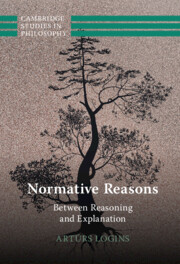Book contents
- Normative Reasons
- Cambridge Studies in Philosophy
- Normative Reasons
- Copyright page
- Dedication
- Contents
- Preface
- Introduction
- Chapter 1 Stage Setting
- Chapter 2 The Reasoning View
- Chapter 3 The Explanation View
- Chapter 4 The Evidence View
- Chapter 5 New Proposal
- Chapter 6 An Application of the Erotetic View
- References
- Index
- References
References
Published online by Cambridge University Press: 21 July 2022
- Normative Reasons
- Cambridge Studies in Philosophy
- Normative Reasons
- Copyright page
- Dedication
- Contents
- Preface
- Introduction
- Chapter 1 Stage Setting
- Chapter 2 The Reasoning View
- Chapter 3 The Explanation View
- Chapter 4 The Evidence View
- Chapter 5 New Proposal
- Chapter 6 An Application of the Erotetic View
- References
- Index
- References
Summary
- Type
- Chapter
- Information
- Normative ReasonsBetween Reasoning and Explanation, pp. 228 - 237Publisher: Cambridge University PressPrint publication year: 2022
- Creative Commons
- This content is Open Access and distributed under the terms of the Creative Commons Attribution licence CC-BY-NC-ND 4.0 https://creativecommons.org/cclicenses/



